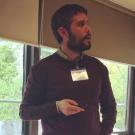There is preliminary evidence that predicates expressing permanent properties, like “being intelligent”, and those expressing transient properties, like “being sad”, are systematically associated with non-trivially different morphological and syntactic expressions in the languages of the world. The aims of the project are 1) to establish this result—the outcome of a short pilot project conducted in 2019—more solidly, 2) to provide a formal account thereof, in terms of a syntactic approach to the lexicon and morphology, and 3) to progress towards the design of experimental methodology that eventually allows us to elucidate whether the differences observed are actually hard-wired.
